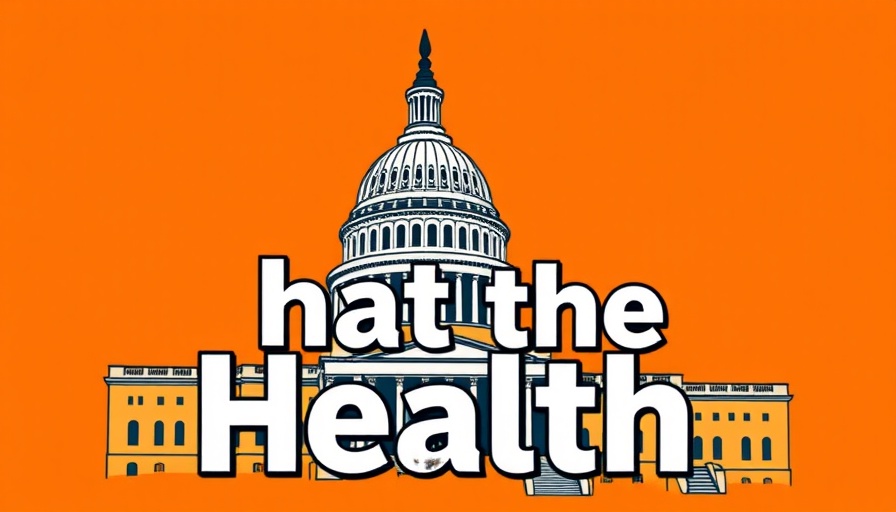
House GOP Faces Crucial Decision on Medicaid Cuts
The recent passage of the House GOP's budget blueprint, which seeks significant cuts to Medicaid, marks a critical moment in U.S. health policy. With a proposal on the table to slashing around $880 billion over the next decade, the potential impact on the nation's most vulnerable populations is profound. Medicaid serves as a safety net for over 80 million low-income individuals, and the proposed cuts have prompted nationwide concern regarding healthcare accessibility and stability.
Understanding the Budget Proposal
In essence, the House's budget plan aims to find extensive savings across various government programs, with Medicaid standing at the forefront of these proposed reductions. This plan must now face a Senate that offers an alternative, more moderate budget without implications for healthcare programs initially. The tension between these two legislative bodies highlights the complexity of budget negotiations amidst differing priorities within the Republican Party itself, especially as some members voice apprehensions about the political ramifications and real-life consequences of Medicaid reductions.
Consequences for Stakeholders: A Ripple Effect
The ramifications of Medicaid cuts are extensive. According to AcademyHealth, a non-profit organization that focuses on advancing health services research, such drastic reductions could threaten the stability of state budgets and healthcare access. As funding dries up, states may need to reconsider eligibility criteria, limits on benefits, and provider payment systems. This creates not only a healthcare crisis for millions but also challenges for policymakers who must navigate a landscape reflecting heightened needs against dwindling resources.
The Broader Implications in Healthcare
Healthcare providers, particularly in rural and minority communities, are already facing challenges that might be exacerbated by the proposed cuts. The American Hospital Association has voiced strong opposition, highlighting the potential harm to hospitals that rely on Medicaid for operational sustainability. As hospitals struggle to maintain care standards amid financial uncertainties, the proposed cuts could lead to a spiral of service reductions and increased healthcare disparities.
Contrasting Perspectives: The Senate’s Position
While the House plan seeks aggressive fiscal measures, the Senate's approach favors maintaining Medicaid integrity. Lawmakers there are concerned that cuts could lead to detrimental health outcomes for already vulnerable populations, often represented in districts with high percentages of Medicaid beneficiaries. This dissonance signifies a battle not just over budgetary allocations but also over fundamental healthcare principles that define American society.
Community Voices: Engaging Public Sentiment
The discourse surrounding Medicaid cuts is not just confined within the halls of Congress. It resonates deeply within communities that depend on these vital services. Advocacy groups are rallying efforts to voice opposition to proposed reductions, emphasizing that cutting Medicaid equates to stripping resources from those who depend on it for long-term care, children's health, and disability services. A unified message emerging from these communities focuses on the indivisibility of healthcare access and societal welfare, stressing that addressing fraud and waste should not compromise essential services.
Legal Battles and Political Dynamics Surrounding Health Funding
Amidst the political turmoil, constitutional challenges are also heating up regarding the authority of the Trump administration in altering previously approved healthcare funding frameworks. Current federal court cases could set precedents influencing how health funds are allocated, emphasizing the importance of transparent governance in healthcare funding decisions.
Future Predictions: Long-term Effects on National Health Infrastructure
Looking ahead, if these proposed Medicaid cuts materialize, they may set a precedent that reshapes America's health landscape for years to come. Experts warn of the potential for narrowed access to preventive care and impacts on infectious disease outbreaks—such as the recent measles incident attributed to cuts in vaccination programs and preventive services. With changes in healthcare policy often taking years to manifest fully, the immediate focus should remain on protecting essential services while paving the way for sustainable reform.
Call to Action: Engaging with Healthcare Advocacy
As developments unfold, stakeholders in healthcare, business, and communities must come together to advocate for the importance of Medicaid as a crucial component of America's health system. Engaging in discussions with local representatives and participating in advocacy initiatives can significantly contribute to shaping a healthier future for everyone. The time to act is now; ensuring healthcare access for all requires a concerted effort from every sector of society.
 Add Row
Add Row  Add
Add 


Write A Comment